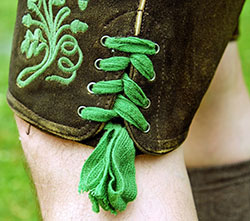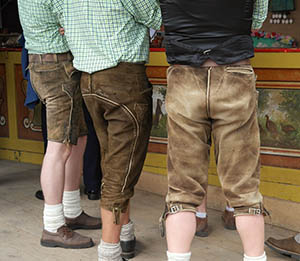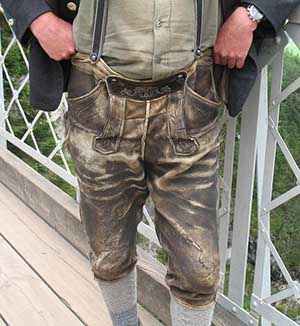 While the Lederhosen originally served as heavy-duty work trousers, today they are possibly the most fashionable cultural asset with a regional reference in the whole of Germany. They have long been worn during not only traditional festivals in Bavaria, but also during carnivals and theme parties the world over. Whether in Berlin, Hamburg or Cologne - where people celebrate with joie de vivre, Lederhosen are an absolute must!
While the Lederhosen originally served as heavy-duty work trousers, today they are possibly the most fashionable cultural asset with a regional reference in the whole of Germany. They have long been worn during not only traditional festivals in Bavaria, but also during carnivals and theme parties the world over. Whether in Berlin, Hamburg or Cologne - where people celebrate with joie de vivre, Lederhosen are an absolute must!
While Lederhosen are mainly worn by men, in recent years the traditional leather trousers have become more and more popular among Ladies and are encroaching upon Dirndl turf - particularly due to the high level of comfort that they offer.
Trachten Lederhosen are richly embroidered and decorated with deer buttons and generally come with braces, connected by a panel of leather at chest height forming an H shape. In the context of the full Trachten costume, a Shirt - which is distinguished by its checkered pattern, is usually worn. In addition, the calves are covered with coarsely-knitted stockings or smart, knee-high socks. Usually, simple, robust leather shoes - often hiking boots, are worn for this purpose. The Lederhose outfit is rounded off with a hat, which is usually decorated with a 'Gämsbart' or small tuft of hair adorning the traditional felt hat.
Lederhosen in many varieties
In addition to the classic Lederhosen for Men, which usually come in black, grey or brown, there are now countless modern reinventioins of the typical Alpine trousers. Whether light blue, white or red, we offer a wide variety of coloured Lederhosen.
The Ladies Lederhosen are also available in pink, brown-pink and green.
Further variety is offered by the materials. Here we offer high-quality varieties made of genuine leather, ensuring maximum wearing comfort. From inexpensive goatskin to deluxe deer hide leather, there is something to suit every taste and budget.
Which occasions are suitable for Lederhosen?
 If you'd like to buy Lederhosen, you may already have a special occasion in mind. But don't limit yourself to this, the possibilities for Lederhosen are vast! The trousers are the perfect garment for occasions with a more traditional feel, festive character or theme:
If you'd like to buy Lederhosen, you may already have a special occasion in mind. But don't limit yourself to this, the possibilities for Lederhosen are vast! The trousers are the perfect garment for occasions with a more traditional feel, festive character or theme:
- Folk Festivals i.e. Oktoberfest
- Festive Parades
- Religious Celebrations
- Village and Rural Festivals
- Public Holidays such as Maypole Harvesting
- Wedding or Family Celebrations
- Theme Parties
Of course, you also have the possibility to wear Lederhosen or at least part of it in everyday situations. If you show up to a party wearing Lederhosen, you are guaranteed to attract a certain amont of attention. More modern twists on the traditional Tracht are leading to a whole new generation of young people wanting to purchase Lederhosen, which we think you will agree is pretty awesome.
The Lederhosen - a garment with a special history
 If you are struggling to fathom what Lederhosen actually are, then we'll explain it for you. Since leather is an extremely hard-wearing, durable and resilient material made by tanners centuries ago, it is not very surprising that Lederhosen have a long history.
If you are struggling to fathom what Lederhosen actually are, then we'll explain it for you. Since leather is an extremely hard-wearing, durable and resilient material made by tanners centuries ago, it is not very surprising that Lederhosen have a long history.
The origin of the Lederhosen, which have become universally known as the traditional costume of Germany, stems from the so-called "Culotte". These are tightly cut knee-length trousers worn in farming.
At the end of the 18th Century, people in southern Germany also turned the trousers into tougher leather to create work trousers for farmers, which replaced the pump trousers used until then. Lederhosen also offered numerous advantages compared to them. The primary use of Lederhose as work-wear also explains the characteristic short cut. This shape basically prevented heat build-up and offered the wearer sufficient freedom of movement. The leather of domesticated animals such as goats and sheep was preferred as their skins were damaged once they had been slaughtered.
More expensive suede was used by the upper classes due to them having hunting rights - a privilege afforded to the higher social classes during this time. The leather was usually dyed black with Bluewood and, in contrast to the traditional costume, which today is decorated very lavishly, no embroidery or decorative chains were included in their production.
The knee-length cut, which is regarded as the typical form of Lederhosen, is still common as a traditional garment in rural Alpine areas and has changed very little since its inception. Sansculotte's long trousers prevailed among the urban population due to the French influence after the French Revolution. They are also occasionally found as traditional trousers in Alpine style although the short cut still reigns supreme.
Picture sources:
© by Couleur/pixabay.com
© by RitaE/pixabay.com
© by Letiha/pixabay.com